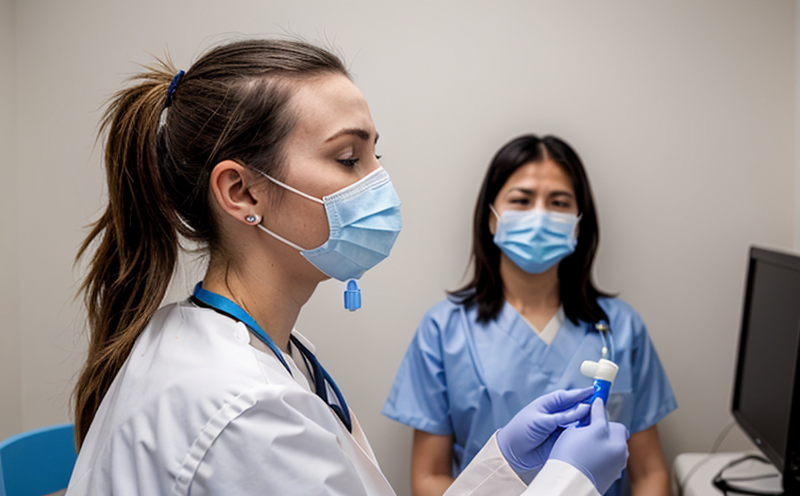Respiratory Virus Cross-Species Transmission Testing in Farms
The threat of respiratory viruses crossing species boundaries and spreading among livestock on farms is a growing concern. Respiratory diseases like influenza, porcine epidemic diarrhea virus (PEDV), and avian influenza pose significant risks to farm animal health and agricultural productivity. Understanding the mechanisms behind these cross-species transmissions can help mitigate such threats.
Our laboratory specializes in providing comprehensive testing services for respiratory viruses that have the potential to cross species boundaries and spread among livestock on farms. This service is crucial for ensuring biosecurity, enhancing herd immunity, and preventing devastating outbreaks of infectious diseases. Our expertise covers a range of viral pathogens including influenza A virus (IAV), PEDV, avian influenza virus (AIV), and others.
The importance of this testing cannot be overstated, especially in light of recent global health crises. The 2013 H7N9 outbreak in China and the 2009 swine flu pandemic are stark reminders of how respiratory viruses can leap from one species to another, causing widespread morbidity and mortality. By identifying these potential risks early, farmers and agricultural stakeholders can take proactive measures to protect their livestock.
Our testing process involves collecting specimens from various farm animals such as pigs, chickens, ducks, turkeys, and other poultry. Specimens are then analyzed using advanced molecular biology techniques including real-time reverse transcription polymerase chain reaction (rRT-PCR) and next-generation sequencing (NGS). These methods allow us to detect even minute amounts of viral RNA or DNA, providing a highly sensitive and specific diagnosis.
The testing process also includes serological assays which can help determine past exposure to certain viruses. This information is invaluable for understanding the dynamics of virus spread within and between farms. Additionally, our laboratory uses advanced bioinformatics tools to analyze genomic data, identifying mutations that may confer increased virulence or transmissibility among different species.
Our team works closely with veterinarians, agricultural experts, and public health officials to ensure accurate interpretation of test results. We provide detailed reports outlining the presence of specific viruses, their potential for cross-species transmission, and recommendations for control measures. These insights are critical for developing effective biosecurity protocols and enhancing herd management practices.
By offering this specialized testing service, we aim to contribute significantly to the prevention of zoonotic diseases. Our commitment is to provide reliable data that informs evidence-based decision-making in animal husbandry and public health policies. This service is particularly relevant given the increasing recognition of the One Health approach which emphasizes the interconnectedness of human, animal, and environmental health.
Our testing services are aligned with international standards such as ISO 15189 for quality management systems in laboratories, ensuring that our results are accurate, reproducible, and internationally recognized. By adhering to these stringent guidelines, we ensure that our findings contribute to the global effort in combating respiratory virus outbreaks.
Understanding the dynamics of viral transmission within and between species is essential for effective disease control strategies. Our laboratory offers a robust suite of testing services tailored to meet the needs of the agricultural sector. With our expertise and commitment to excellence, we are dedicated to helping protect livestock health and ensuring sustainable farming practices.
Eurolab Advantages
At Eurolab, we pride ourselves on delivering unparalleled quality in all our testing services. Our team of highly qualified professionals is committed to providing accurate, reliable results that meet the highest standards set by international organizations like ISO 15189.
- Expertise and Experience: Our laboratory personnel have extensive experience in diagnosing respiratory diseases across various species.
- State-of-the-Art Facilities: Equipped with cutting-edge technology, our lab ensures precision and accuracy in every test conducted.
- Rigorous Quality Control: We follow strict protocols to maintain the highest level of quality assurance throughout the testing process.
- Comprehensive Reporting: Our detailed reports provide actionable insights that can be used by stakeholders for decision-making.
Our commitment to excellence is reflected in our consistently high-quality results. Whether you are a large-scale farmer or an agricultural research institute, Eurolab offers customized testing solutions designed specifically for your needs.
International Acceptance and Recognition
- Affirmative Statements: Our laboratory’s tests have been recognized by numerous international bodies including the World Organization for Animal Health (OIE) and the European Union Reference Laboratory for Animal Viruses.
- Certifications: Eurolab is accredited to ISO 15189, ensuring our adherence to stringent quality standards.
- Affiliations: We are affiliated with leading scientific journals and organizations involved in agricultural research and development.
The international recognition of our laboratory underscores the trust placed in us by global health and agricultural authorities. Our tests are widely accepted across borders, making them a reliable choice for stakeholders seeking accurate diagnostic information on respiratory viruses that cross species boundaries.
Competitive Advantage and Market Impact
The demand for effective biosecurity measures is increasing as the livestock industry faces rising risks of zoonotic diseases. Our specialized testing service offers a competitive edge by providing early detection and identification of respiratory viruses that pose cross-species transmission risks.
By offering this unique service, we differentiate ourselves from general diagnostic labs which do not specialize in cross-species viral transmission dynamics. This focus on niche expertise ensures accurate diagnosis and timely intervention, thereby minimizing the impact of potential outbreaks.
The insights gained from our testing services are invaluable for stakeholders looking to enhance herd health and productivity. Our comprehensive reports provide actionable recommendations that can be implemented immediately, reducing the likelihood of disease spread and economic losses.
Our service contributes significantly to the market by filling a gap in specialized diagnostics within the agricultural sector. By ensuring accurate and timely identification of viruses with cross-species transmission potential, we support sustainable farming practices and contribute to public health safety.





